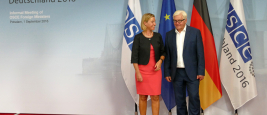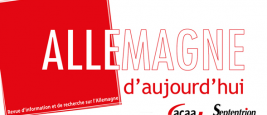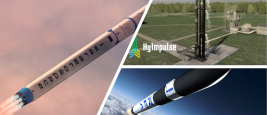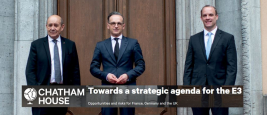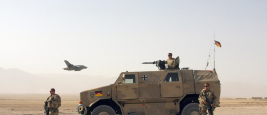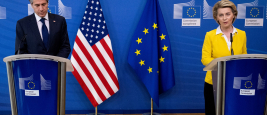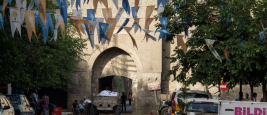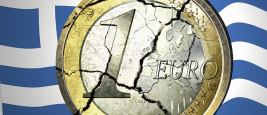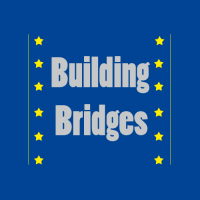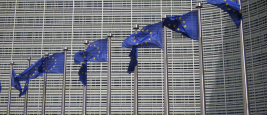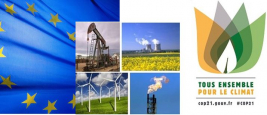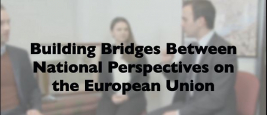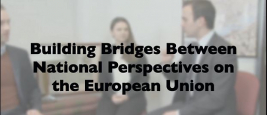As a consequence of the positive momentum in Transatlantic relations brought about by the arrival of the Biden administration, significant progress is expected on a range of key digital issues.

Europe
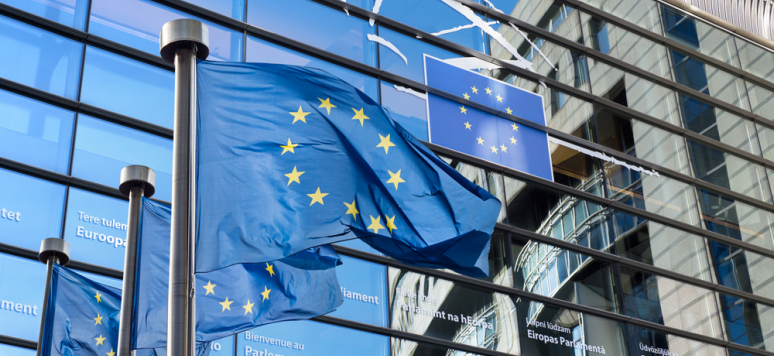
European issues are transversely covered by most of Ifri's centers and programs.
Some programs pay particular attention to these themes: the Study Committee for French-German relations (CERFA), the French-Austrian Center for European Convergence (CFA).
All European themes — institutional, economic, citizenship, security — are subject to specific studies and debates.
Advisor to the Executive Chairman, editor-in-chief of Politique étrangère and co-director of RAMSES
...Special Advisor to the President for European Affairs
...Secretary General of the Study Committee on Franco-German Relations (Cerfa)
...Research Fellow, Study Committee on Franco-German Relations (Cerfa)
...Associate Research Fellow at the Austro-French Centre for Rapprochement in Europe (ÖFZ)
...As an essential platform for multilateralism, the Organization for Security and Co-operation in Europe (OSCE) has always been important to German diplomacy, although in varying degrees. Historically, Germany’s support for the Conference on Security and Co-operation in Europe...
The year 2020 was to be a pivotal year for (re)formulating Europe's Africa strategy. Germany and France were committed to strengthening relations between the two continents and to consolidating them at the sixth summit of the African Union and the European Union, which was postponed because of...
EU policy on migration and asylum is being built for the last 20 years. But this process is today on hold although France and Germany support the same position on this matter. However, the “migration crisis” in 2015 highlighted the weakness of the Franco-German alliance and the extend to which...
Satellite constellations have become core elements of the digital transition. Over the next decade, several thousand satellites will have to be launched, to build these constellations. For positioning satellites, preferably in Low Earth Orbit (LEO), reliable and affordable launch...
EU-Japan relations have undergone a major uplift over the past 5 years. Bound by the Economic and Strategic Partnership Agreements, as well as the Partnership on Sustainable Connectivity, the two once-distant players have been stepping up efforts to address the many shared security concerns in...
This paper explores how the E3 format – involving France, Germany and the UK – might develop in response to the challenges presented by the UK’s departure from the EU. The paper outlines how the trilateral format has supported policymaking to date, most notably in dialogue on Iran’s nuclear...
Analysis from 17 countries and EU institutions reveals that Chinese soft power in Europe – defined as the ability to influence preferences through attraction or persuasion – has seen better days.
In Germany's parliamentary democracy, political parties play an important role in mandating Bundeswehr missions abroad and in overseeing their deployment. The political debate on these deployments is polarized between opponents, who are called “pacifists”, and supporters, who are called ...
To respond to growing global competition, the EU has made notable progress on the internal dimension of technology policy over the past 3 years. It is now also seeking to adapt its foreign policy
Is Turkey a reliable partner for Europe?
Registrations are now closed for this event.
...
Europe's Greek Crisis: Hang Together or Hang Separately? Perspectives on the Future of the Eurozone
Seminar in Brussels
...
Building Bridges: Workshop III in Brussels
The third Building Bridges workshop took place on 28-29 September 2015. This event included a discussion between experts involved in the project and Belgian citizens about the impact European integration had on Belgium and what citizens' expectations are for the future. ...
The US election of 2016: outlook and scenarios
Nothing is going as predicted in the US campaign: the favorites of six months ago are struggling while radical candidates are making the front page. On the right Jeb Bush polls third behind Donald Trump; on the left, Clinton is losing ground to Bernie Sanders. What does this say...
EU Reform: Deciphering the fuzziness
Almost all member states and EU institutions have included "EU reform" within their lexicon, but its definition differs from one actor to another. This event will focus on the debates over integration emerging from talks of "EU reform". <...>
Building Bridges: Workshop II in Madrid
The second Building Bridges workshop took place on 6-7 July 2015 in Madrid. It was hosted by the Elcano Royal Institute. This event included a discussion between experts involved in the project and Spanish citizens about the impact European integration had on Spain and what...
United Kingdom/European Union: Towards an Amicable Divorce? Les Mensuelles Ifri/Entreprises
These luncheon-debates are dedicated to corporate and individual benefactor members. By personal invitation only.
COP21: the Role of the EU and of its Members in the Climate Negotiations Views from the Weimar Triangle Countries
By invitation only
Building Bridges: Workshop I in Warsaw
The first Building Bridges workshop took place on 11-12 May 2015 in Warsaw. It was hosted by the Polish Institute for International Affairs (PISM). This event included a discussion between experts involved in the project and Polish citizens about the impact European...
What will Britain’s post-election EU policy be and how will member states react?
The UK general election on 7 May 2015 promises to be exciting, with a more fragmented political landscape on the horizon. Divisions no longer just concern the Labour-Conservative divide, but also national identity and EU membership.
...This new episode of the Building Bridges Conversation Series is part of the "Building Bridges" project, which aims to foster debate on the future of the European Union and offer top quality...
The offer of active military support to France in Syria or in the Sahel by several European member states is likely to overshadow the absence of meaningful commitment from others. On balance, the picture will not be too disheartening for supporters of the EU: its foreign and security policy...
This new episode of the Building Bridges Conversation Series is part of the "Building Bridges" project, which aims to foster debate on the future of the European Union and offer top quality...
France has been ambivalent on the British renegotiation campaign. The general mood is to keep the UK in, but messages are going in different directions. Some are shrugging off the UK’s calls for reform and are not trying very hard to accommodate Westminster. Others seem keener to find an...
John Seaman answers questions from the China Daily on the recently concluded negotiations of the Trans-Pacific Partnership (TPP) and their consequences for China and for Europe.
...Without real and profound change in Greece's dysfunctional state, it is almost irrelevant whether the country reaches a short-term deal with its creditors or not, say analysts. "Greece cannot perform economically well in the long-term without major structural reforms. These need to address the...
This first episode of the Building Bridges Conversation Series is part of the "Building Bridges" project, which aims to foster debate on the future of the European Union and offer top quality...
L'Allemagne a annoncé qu'elle allait publier en 2016 un nouveau Livre blanc sur la défense. Cet exercice pourrait illustrer que les signaux positifs, mais dispersés, lancés par l'Allemagne depuis un peu plus d'un an auguraient d'un réel changement de posture stratégique, gage d'une reprise...
Prime Minister David Cameron, with a majority mandate from the British people, is off on a whirlwind tour of European Union capitals to seek “a better deal for Britain,” warning that otherwise, Britain will leave the bloc.
...








